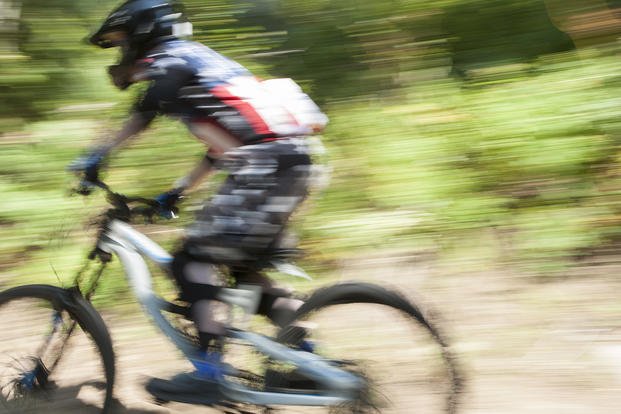On Veterans Day, our thoughts turn to those who have served our country with honor, dedication and distinction. However, it is worth noting that although America’s veterans may have hung up their military uniforms for the last time, many recognize that their abilities can make a difference in their communities and across the country. Research clearly shows a higher level of involvement in local charities, volunteer work and local politics by veterans, compared to their civilian peers.
Jonathan Hagerman turned his love of mountain biking into a way to serve his fellow veterans.
Hagerman was five years old when he determined that he would join the military.
An Air Force brat, he grew up watching his father deploy to the Gulf War, so becoming a "military guy" seemed like the natural path for him. On 9/11, at age 14, he watched the second plane hit the Twin Towers on TV and remembers that as the moment he resolved to "fight to preserve the liberties we love and enjoy."
In 2009, he kept his word and joined the Marine Corps. When asked why he chose the Marines, he grinned and said, "I figured anything worth doing was worth doing with the best, right?"
Shortly after joining the fleet as a utility engineer in 2010, he volunteered to deploy to Afghanistan. "You don't join the Marine Corps unless you're willing and eager to deploy, so my hand went up," he said.
Most of his battalion went to Camp Leatherneck, but a small detachment of Marines, including Hagerman, was sent to Sangin in Afghanistan's Helmand Province, widely considered one of the most dangerous conflicts of the war.
"It was the middle of nowhere," Hagerman said. "[We] heloed in. All of our supplies were [container delivery system] drops for a long time, MREs, baby wipes, the whole nine yards. … The units that were there took some of the heaviest casualties and personnel losses since the Vietnam conflict. It was nonstop."
Hagerman was in Sangin for 7.5 months.
When he returned home from deployment, he was ready to focus on civilian life, but he soon found the stress of daily life beginning to wear on him. Busy raising a young family and concentrating on his undergrad degree and his MBA, he also missed the brotherhood of the Marine Corps.
"For four years, I was a Marine. I woke up every day, shaved and put on my uniform; that became my identity. And then, once I left, they handed me my DD-214 and said, 'Bye.’ I felt lost for a bit," he said.
One night while he was online, he saw an ad for a mountain bike reminiscent of the one he rode in high school. Growing up in Utah, Hagerman had been an avid mountain biker.
"My first bike cost more than my first car," he said.
Although it had been more than 10 years since he had ridden, he bought the bike anyway.
Once he returned to the trails, Hagerman's love for the sport came back immediately.
"Anyone who bikes knows that [N+1] is the perfect amount of bikes to have," he joked. "You can't have just one."
Hagerman soon bought another bike; this one was a bit newer and equipped with specialized components. Rather than leaving one bike in the garage to collect dust, he began inviting friends and co-workers, mostly veterans, to ride with him. One in particular, a retired Marine lieutenant colonel, helped him come up with the idea for The Dirt Therapy Project right there on the trails.
"I noticed what a change it was making in my life having that outdoor time, the physical exertion, the enjoyment, the thrill of being on a bike," Hagerman said. "Getting back into the sport, I crashed a lot, and that was thrilling. It's not like getting shot at, but it's a thrill to go fast and crash. I really wanted to be able to share that with other people."
Combat veterans often miss the exhilaration and adrenaline rush that military service necessitates. Hagerman said the path to healing and processing is different for everyone, but for him, biking was the answer. He figured he couldn't be the only one. Hagerman added that when he goes through a challenging experience, he wants to make that experience "easier or better for the next person who has to face it."
"I know that not everybody is gonna want to mountain bike, but I want everybody who wants to [bike] to have access to gear and equipment," Hagerman said.
The Dirt Therapy Project is open to anyone who has worn the uniform. Hagerman understands that transitioning service members sometimes struggle to come to terms with where they fit into the civilian world.
"I think a lot of people underestimate what transition is like when you leave the military," Hagerman said. "It's very abrupt, and it happens quickly. You think it will just be a band-aid. But then you rip it off, and you find that the sting lasts longer than you thought it would."
The Dirt Therapy Project's mission is to introduce veterans to mountain biking and recreational therapy, as well as to provide a sense of community and esprit de corps that veterans miss once separated from the military. The program provides veterans with an opportunity to try a new sport, hang out with fellow vets and be with people who understand them.
There's an instant bond between former service members who share a common interest. More than 300 people have participated in The Dirt Therapy Project so far.
"I think people underestimate the healing power of nature. … Being outside has an extremely therapeutic benefit … and if you can do it on a bike, all the better," Hagerman said.
He receives many messages thanking him for the program, including this one:
"Jonathan, I am incredibly thankful for the opportunity to join TDTP trip to Angel Fire [New Mexico]. I've never done anything like that and never thought I would either. It was an amazing experience. You and the other veterans really inspired a lot of confidence in me, and it helped me overcome the fear of new mountain bike challenges [since I'm a newbie] and helped me face some personal stuff. Mountain biking is something new to me, and it has helped unlock some mental and emotional things so that I can start working on them. Uncomfortable as some of them may be, I would not have had the opportunity to realize things about myself that enable me to enrich my own quality of life, and hopefully, those around me. Thank you!"
Hagerman started The Dirt Therapy Project with $4,000 raised by his family and friends. He bought bikes at close to retail prices, looking for sales and using military discounts. However, a large, specialized biking company recently signed on to sponsor The Dirt Therapy Project with a fleet of eight bikes for 10 months at a time.
The Dirt Therapy Project currently offers monthly rides in San Antonio, North Carolina, Denver and now in Arkansas. Two or three times a year, it offers a larger multi-day event.
Hagerman said he would love to offer the program nationwide someday.
"This is my heart's desire, my true passion," he said. "I love helping veterans and introducing them to the sport. … My invitation is to come out and try it one time. Maybe it's for you; maybe it's not for you. You'll never know until you try it. Just give it a try."
Keep Up with the Ins and Outs of Military Life
For the latest military news and tips on military family benefits and more, subscribe to Military.com and have the information you need delivered directly to your inbox.












